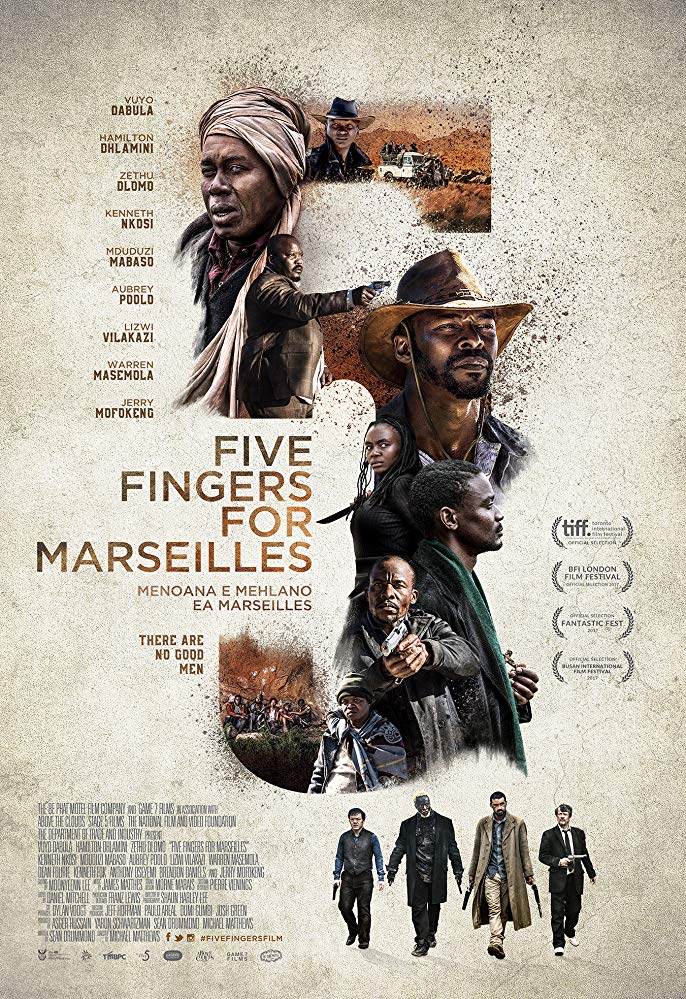Five Fingers for Marseilles is a modern western film coming out
of South Africa. The South African production is a multi-language film including
dialogue in Xhosa, Southern Sotho, Afrikaans and English.
Five Fingers for Marseilles tells a harrowing tale of an old
group of friends who grew up in a rural South African village on the fridges of
society.
The film first follows the friends as
children and fast-forwards to the modern day, where each of the characters have
gone their own ways in life.
The South African film touches on a surplus of real world
themes revolving around post-apartheid South Africa, systemic racism and the
continued oppressive rule Europeans have over indigenous and African
populations.
Five Fingers for Marseilles is a very unique film and as a film
in the western genre, it tells a very different story than what most audiences
are used to.
Synopsis
Five Fingers for Marseilles focuses on a group of friends
growing up in a small rural town known as Marseilles, South Africa. During
their childhood, the village was constantly at the mercy of the South African
police who rule the many rural towns in the area with oppressive control.
The five friends (all children at this point) see what’s
happening around them and cannot understand why no one is doing anything about
it. Together they imagine themselves as superheroes who can save their village,
calling themselves the ‘five fingers for Marseilles’. When the police next visit the village again, abusing the townspeople the five fingers take action resulting in armed
conflict with the police and the five friends being disbanded.
Now fast forward into the future, and each of the five
friends have gone their own ways in life. The main character and old leader of
the group, Tau has become an outlaw, moving from town to town in order to
survive. Eventually, after twenty years on the run, Tau finds himself back at
Marseilles. Here he noticed just how much has changed, and not for the good.
The remainder of the film follows Tau as he finds more about
his old hometown as well as attempts at reconnecting with his old friends while
conflict yet again ensues around the village, just like twenty years prior.
Important Themes
Five Fingers for Marseilles explicitly touches on themes centered on post-apartheid South Africa, the continued maltreatment of African populations and modern forms of cultural racism present in the region.
There is no question that racism cannot be stopped
overnight, especially so in regions of the world where racism and segregation
literally started war and conflict. The Apartheid era still
has significant implications to today in South Africa.
Despite measures being enacted to create virtues of equality
and inclusion, racism and segregation is still deeply embedded into society.
Relations between European and African populations still remain quite hostile,
popular stereotypes are still shared and even in giant cities like Johannesburg
and Cape Town the divide between the two parties is still very apparent.
Racist rhetoric is still a very large predominant theme
within smaller communities. Even worse, in these small towns much of this
rhetoric leads to physical violence taking place. Whether that be as a result
of white citizens feeling superior to their African counterparts, right-wing nationalists planning attacks or continued dehumanisation
of black communities taking place. For more reading on the matter here is an article written by the BBC on the topic.
Even today, hostilities between white and black populations
is being compared to levels seen with Palestine-Israel relations. With the South
African government itself still not doing enough to pass effective policy pushing
for actual equality, instead still operating in many ways like that of twenty
years ago.
Leading many political scientists, foreign policy experts and community
leaders stating that the government is still steeped with xenophobic belief; especially when it comes to small
communities and areas in rural South Africa.
Conclusion
Altogether, Five Fingers for Marseilles is a
very interesting film. It tells of a story with deep roots to colonial history,
racism, distrust and conflict.
By making the film a western, it allowed for the
film to become something truly unique. With that being said, I don’t think you’ll
ever watch anything else like it.
Five Fingers for Marseilles offers an abundance. It’s not often
that you see a western with characters riding run-down cars and shooting
machine guns out of their windows.
The South African production did a great job of tying together traditional and modern themes as well as contrasting them with a rural village in the modern era.
The South African production did a great job of tying together traditional and modern themes as well as contrasting them with a rural village in the modern era.
If you’re looking for film that is a bit different but
highly entertaining, consider checking out Five Fingers for Marseilles. It’ll
surprise you in many ways!


